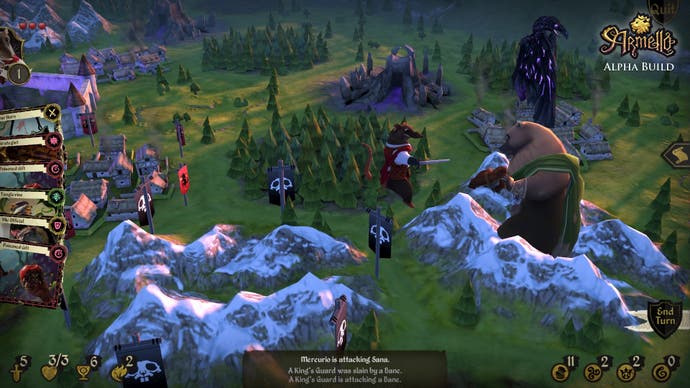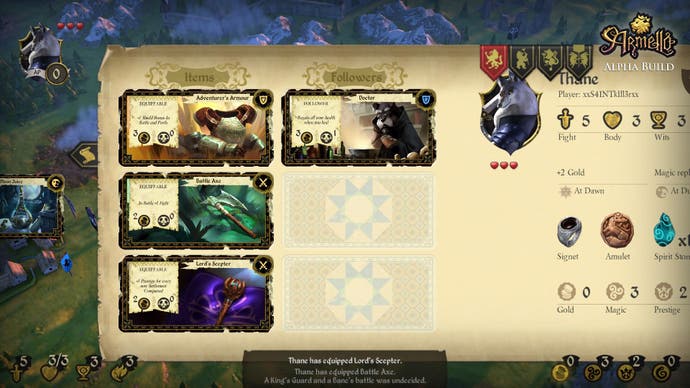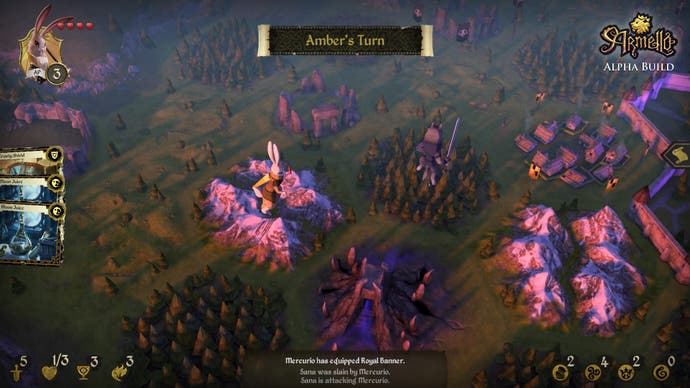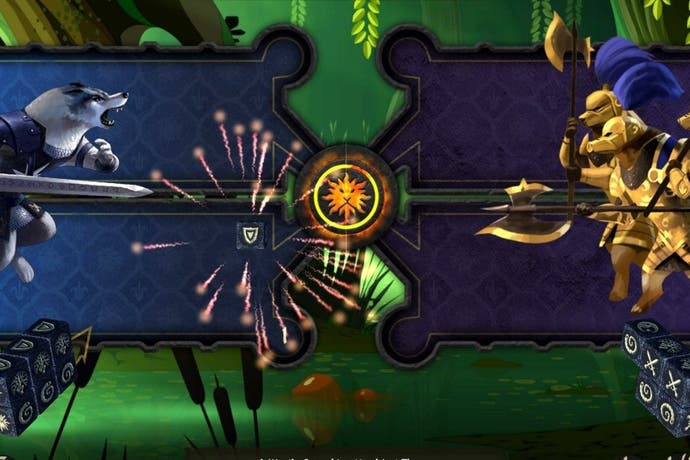Exploring Armello, the entirely original board game bound for iPad
From table to tablet.
As I began writing this preview, Armello was on the cusp of Kickstarter success. As I finished it, it achieved that success, comfortably passing the $200,000 AUD mark with a couple of days still to run. It's a validation for League of Geeks, the patchwork development team behind the project because, while Kickstarter is often a source of funding for many niche projects, it's fair to say that Armello is particularly niche, perhaps even quite singular.
Armello's developers call it a "digital board game" but it's not simply an app conversion of an existing board game. It's a digital incarnation of an entirely original board game, a fantasy game that League of Geeks first created in physical form. That iteration was only a means to an end, a way for the team to rigorously test its mechanics and balance before it transcended our material plane to become electronic entertainment.
It's akin to making two games, one after the other, and it certainly hasn't been a quick process. Three years ago, League of Geeks (who describe themselves as a "development collective" whose day jobs have them working on other projects) came together out of hours with the intention of creating a board game for tablets that would make the most of what the platform had to offer.

"We were all playing board games on our iPad and, back then, they were all atrocious," says designer Trent Kusters. "They were, frankly, just not acceptable. We felt it was a complete injustice because the iPad is such a fantastic platform to do digital board games."
After eight months of evening prototyping on their "passion project," Kusters and his colleagues finally had something they were comfortable with. "We went through about ten prototypes during that time," says Kusters. "About version ten, we honed for maybe six more revisions because when we got to version ten it was like 'Yep, this is it.'"
"It was just like a board game design club," explains artist Ty Carey. "We'd get together, play it for a couple of hours and then sit up for a few more hours discussing the mechanics and what we enjoyed. It actually started out more like a strategic board game, with the armies of Armello marching against each other. Then we started introducing heroes and then eventually we dropped the other units because the heroes were much more fun."
If it sounds to you like a convoluted process, bear in mind that it allowed League of Geeks to not only carefully refine their game, but also to experiment, even to make significant changes without worrying that they had to abandon great tracts of code. After all, at this stage, Armello was mostly card and paper. It could easily evolve. It did.
"The three major designers on the project were myself, Ty and one of the other directors called Blake Mizzi," says Kusters. "I'm really into RPGs and those big world experiences with exploration and dynamic narratives. Ty loves his tabletop and card games, while Blake is our wargamer. Between the three of us, there was tug of war, because Ty would design something, Blake would look at it and it would have all this wargame stuff thrown at it. Then I'd take it and I'd have removed some of the wargame stuff and put some RPG mechanics in there. It ended up being this really nice, elegant balance of all our loves."

The result is a colourful and complex creation, mixing traditional high fantasy adventure with political machinations. The king of the titular Armello has fallen ill and the resulting power vacuum is just waiting for an ambitious player to fill it. There's more than one route to success. Each player can choose how they want to exploit the opportunity as they quest their way across the land, perhaps challenging the ailing ruler, perhaps attempting to succeed him or perhaps even trying to master the same strange force that has weakened the king and twist it to their own ends.
Whatever their choice, League of Geeks want to shower them with possibilities. Adventuring in the land of Armello offers all sorts of treasures, tactics and trickery, with players collecting cards that represent things such as spells, traps and followers, but which can also be played to influence the fights that they'll inevitably find. Cards can be kept for their benefits or burned to guarantee particular die rolls. They can also be combined to create what the developers say could be an enormous range of possibilities and unusual, distinct powers.
"We've got hundreds of cards and you can never predict the combinations and permutations," says Carey. "We know what they do, but watching how people use them, seeing how all of that comes together, that's a huge unknown. And we want our system to be ungrokable, in a sense. So you understand that, no matter how good someone is, you might be able to play a certain combination of cards or a particular tactic that can beat them. Players should feel they have ownership over their tactics, but not that they're complete masters of the game."
Armello isn't simple and, though it does exist as a playable, physical prototype, League of Geeks are making the most of its digital format to automate some of its complex mechanics. At the same time, they say there's a considerable challenge in keeping the feel of a board game, not only from giving an impression of tactility, but also in clearly showing players the calculations and chains of consequence that determine what happens. Still, says Kusters, it's preferable to playing through the slower, real-world version, which the team are always being asked about.
"The irony of this is, we made a board game to make a great digital board game, then we show everyone the digital board game and they say 'This is fantastic! Can we have the board game?'" he says. "But we designed the game for digital platforms. We made no attempt to make it accessible or efficient to manufacture as a physical game. It takes one or two extra GMs who aren't playing to run a game of Armello. It's very, very heavy."
Niche as all this may sound, Armello has had its fair share of interest beyond just its backers. "From the time that we announced the game we've had multiple offers, offers from big publishers," Kusters continues. "The curling finger, you know. 'Step inside! Here's a big pile of money.' But our independence is what matters to us and if want to make a call on whether something is good enough to go out or not, we have the power to do that." His response to this echoes the sentiment common among Kickstarters these days, but it also extends, albeit more gently, to Armello's ever-growing community of backers. Their feedback is appreciated, he says, but they won't be back-seat drivers.

"It's super, super-easy for people to get hold of you nowadays and for a dialogue to be there, but I think if you're not a really strong-headed creative, you can easily lose your way or forget what it is that you want to see from a game," Kusters says. "Especially when you have fifty people on a forum saying that it's the wrong decision. But it's not like Bob Dylan would take advice from someone in his audience about how he should play his songs."
That's partly because the team also have a strong idea of their creative vision for the game. League of Geeks aren't just game designers, they're also world-builders and the detailed and sometimes very dark world of Armello is something they want to carefully guard. Their influences include films as "indie" and as unique as they hope Armello will be.
"80s movies are big for us, things like The Dark Crystal. These movies lasted the test of time and they're still very dear to people." says Carey. "When you look at them now, they hold up pretty good, but it's also the fact that they're a little more indie. The conventions of what fantasy movies could be has come together now, it's formulaic. It's a good formula, but back then it was a little more out there. You watched The Dark Crystal back then, as a kid, and you realised you were in a very different place. That's what we're trying to bring to Armello, that kind of spirit."
And the hope is also that the spirit of Armello will grow beyond just this game. After building a board game to build a video game, League of Geeks hope to have a chance to continue to build a world in which they might set more adventures. That will come in time, perhaps. Armello has already been in development for three years and, as Kusters says, it's important not to rush things.

